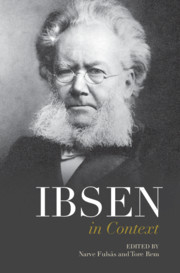44 results
Further Reading
-
- Book:
- Ibsen in Context
- Published online:
- 23 April 2021
- Print publication:
- 15 April 2021, pp 272-283
-
- Chapter
- Export citation
Part II - Culture and Society
-
- Book:
- Ibsen in Context
- Published online:
- 23 April 2021
- Print publication:
- 15 April 2021, pp 27-106
-
- Chapter
- Export citation
Chapter 2 - From Theatre to Book
- from Part I - Life and Career
-
-
- Book:
- Ibsen in Context
- Published online:
- 23 April 2021
- Print publication:
- 15 April 2021, pp 11-18
-
- Chapter
- Export citation
Chronology
-
- Book:
- Ibsen in Context
- Published online:
- 23 April 2021
- Print publication:
- 15 April 2021, pp xxi-xxiv
-
- Chapter
- Export citation
Part IV - Internationalization
-
- Book:
- Ibsen in Context
- Published online:
- 23 April 2021
- Print publication:
- 15 April 2021, pp 147-212
-
- Chapter
- Export citation
Contributors
-
- Book:
- Ibsen in Context
- Published online:
- 23 April 2021
- Print publication:
- 15 April 2021, pp x-xiv
-
- Chapter
- Export citation
Index
-
- Book:
- Ibsen in Context
- Published online:
- 23 April 2021
- Print publication:
- 15 April 2021, pp 284-302
-
- Chapter
- Export citation
Part V - Afterlives
-
- Book:
- Ibsen in Context
- Published online:
- 23 April 2021
- Print publication:
- 15 April 2021, pp 213-271
-
- Chapter
- Export citation
Chapter 3 - Bourgeois Drama
- from Part I - Life and Career
-
-
- Book:
- Ibsen in Context
- Published online:
- 23 April 2021
- Print publication:
- 15 April 2021, pp 19-26
-
- Chapter
- Export citation
Notes on the text
-
- Book:
- Ibsen in Context
- Published online:
- 23 April 2021
- Print publication:
- 15 April 2021, pp xx-xx
-
- Chapter
- Export citation
Chapter 1 - Early Years in Norway
- from Part I - Life and Career
-
-
- Book:
- Ibsen in Context
- Published online:
- 23 April 2021
- Print publication:
- 15 April 2021, pp 3-10
-
- Chapter
- Export citation

Ibsen in Context
-
- Published online:
- 23 April 2021
- Print publication:
- 15 April 2021
Preface
-
- Book:
- Ibsen in Context
- Published online:
- 23 April 2021
- Print publication:
- 15 April 2021, pp xv-xix
-
- Chapter
- Export citation
Part III - Scandinavian Reception
-
- Book:
- Ibsen in Context
- Published online:
- 23 April 2021
- Print publication:
- 15 April 2021, pp 107-146
-
- Chapter
- Export citation
Figures
-
- Book:
- Ibsen in Context
- Published online:
- 23 April 2021
- Print publication:
- 15 April 2021, pp viii-ix
-
- Chapter
- Export citation
Contents
-
- Book:
- Ibsen in Context
- Published online:
- 23 April 2021
- Print publication:
- 15 April 2021, pp v-vii
-
- Chapter
- Export citation
Part I - Life and Career
-
- Book:
- Ibsen in Context
- Published online:
- 23 April 2021
- Print publication:
- 15 April 2021, pp 1-26
-
- Chapter
- Export citation
Copyright page
-
- Book:
- Ibsen in Context
- Published online:
- 23 April 2021
- Print publication:
- 15 April 2021, pp iv-iv
-
- Chapter
- Export citation
Introduction
-
- Book:
- Ibsen, Scandinavia and the Making of a World Drama
- Published online:
- 13 November 2017
- Print publication:
- 16 November 2017, pp 1-8
-
- Chapter
-
- You have access
- HTML
- Export citation
Note on the Text
-
- Book:
- Ibsen, Scandinavia and the Making of a World Drama
- Published online:
- 13 November 2017
- Print publication:
- 16 November 2017, pp xii-xii
-
- Chapter
- Export citation

